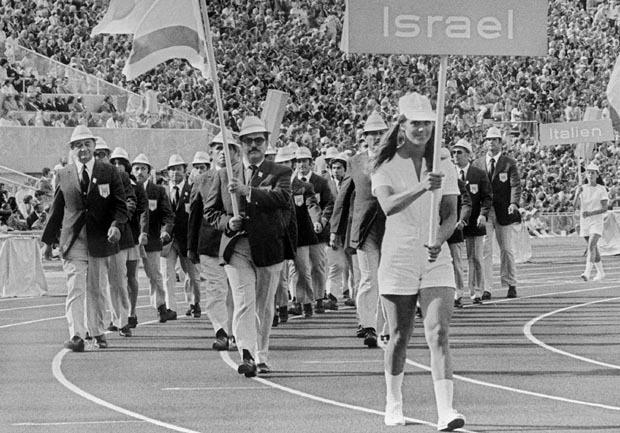11 Israeli athletes slain at Munich Olympics remembered at London memorial
(AP) LONDON - Britain's prime minister and top Olympic officials gathered Monday to mark the 40th anniversary of the deaths of 11 Israeli athletes in a terrorist attack at the 1972 Munich Olympics - a quiet moment on the sidelines of the London Games.
Still, the memorial promised to be bittersweet for the families of the slain athletes, many of whom have campaigned for decades for a moment of silence during the games' opening ceremony.
Their demands were again rejected this year, despite personal appeals by widows Ankie Spitzer and Ilana Romano to Jacques Rogge, the head of the International Olympic Committee.
IOC: No special tribute to slain Israelis at '72 Munich Games
CBSNews.com Complete Coverage: 2012 London Olympics
Rogge held an impromptu moment of silence at the athletes village during the London Games, but has otherwise insisted that the memorial, held in London's medieval Guildhall, is the appropriate way to honor the dead.
British Prime Minister David Cameron led the tributes, appealing to the mourners to remember the 11 dead as fathers, husbands and athletes who did nothing more than represent their country in sport.
"As the world comes together in London to celebrate the games and the values it represents, it is right that we should stop and remember the 11 Israeli athletes who so tragically lost their lives when those values came under attack in Munich 40 years ago," he said. "It was a truly shocking act of evil. A crime against the Jewish people. A crime against humanity. A crime the world must never forget."
Munich's 1972 Olympics were meant to right an historical wrong. They were the first held in Germany since the 1936 Berlin Olympics, which were tainted by images of Nazism. But the Black September Palestinian militant group penetrated the laxly secured athletes village and took Israeli team members hostage. Eleven died at the village or in a botched rescue attempt.
The games were briefly suspended, but the Olympics were forever changed. Security costs soared and kept rising with every games.
The families have carried their grief, asking that the sacrifices of their fathers, brothers and sons be noted at the Olympics, the celebration of peace, brotherhood and sport in which they died.
The IOC says the opening ceremony is not an appropriate arena to remember the dead, despite pressure from politicians in the United States, Israel and Germany. A committee started by a Jewish organization in Rockland, New York, has gathered more than 100,000 signatures for the moment of silence and counts President Barack Obama among its supporters.
The families flatly reject the official reasons they've been given over the years for why this cannot happen. At Montreal, they said they were told the reason was that the Arabs would leave. At Barcelona, it was unwillingness to bring politics to the games. At Atlanta, the reason was protocol. At Athens, organizers said it was not the appropriate time.
Cameron said Britain, too, had suffered at the hands of terrorists, recalling the transit attacks on July 7, 2005, that killed 52 commuters the day after Britain won the Olympics.
Cameron noted that Britain's "euphoria at winning the right to host these Olympics was brutally shattered within just 24 hours" by the bombings.
"But our two countries, Britain and Israel, share the same determination to fight terrorism and to ensure that these evil deeds will never win," he told the audience.
"Seven years on from 7/7, I am proud that as we speak, this great city of London, probably the most diverse city in the world, is hosting athletes from 204 nations. And I am delighted that a strong Israeli team is among them," he added.
